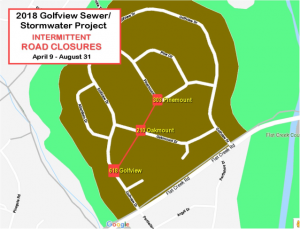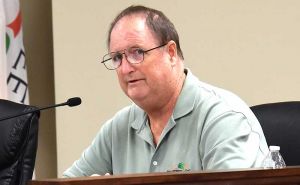Assistant Chief Stan Pye impressed with Israel’s approach to community policing
There is always more to learn in the ever-challenging world of law enforcement. Sometimes that learning occurs outside the U.S. It was in Israel during June that Peachtree City Assistant Police Chief Stan Pye and Ga. Bureau of Investigation Deputy Director Scott Dutton joined a group of colleagues in a public safety leadership program through the Georgia International Law Enforcement Exchange (GILEE).
Above, Peachtree City Assistant Police Chief Stan Pye (center, striped shirt) and Ga. Bureau of Investigation Deputy Director Scott Dutton (L), were two of a group of 21 U.S. law enforcement officials to visit Israel in June as part of the Ga. International Law Enforcement Exchange (GILEE) public safety leadership program. Photo/Submitted.
Participating in the 26th annual peer-to-peer training program, Dutton and Pye were on the ground in Israel June 11-26. Members of the 21-person delegation included senior law enforcement officials from Georgia, Alabama and Tennessee.
The group studied best practices and the latest advances in community policing, counterterrorism, emergency management, advanced technologies and homeland security policies, according to GILEE Executive Director and former Fayetteville Police Chief Steve Heaton.
Heaton said this year’s peer-to-peer training emphasized community policing. And it was the Israeli approach that impressed Pye and Dutton.
Dutton said the objective of the trip was to engage in an information exchange, bringing new ideas from each country, and focusing on community relations and community policing.
“They have been ramping-up community policing. They are community-oriented, and they believe in what they are doing,” Dutton said.
“They try to bridge the gaps that have been existing for years in that part of the world,” Pye added.
Pye said the U.S. officers visited the newly established administration for services to the Arab Sector, where Maj. Gen. Jamal Hakroosh, the first Arab Muslim major general with Israeli police, briefed them. The group met with Arab cadets in the police academy, who after graduation will become commissioned officers, and saw community policing in action in the northern city of Akko, where police bridge potential and real tensions between various religious groups. The delegation also participated in an emergency drill at Rambam hospital that prepares the hospital for times of massive missile attacks.
In the U.S., conflict categories take many forms. Israel, too, has its own type of conflicts, including religious and territorial.
“In Israel, law enforcement works with different religious groups to bring them together and to protect their country,” Pye noted.
“And they are doing a tremendous job at it,” said Dutton. “With them, failure is not an option.”
Law enforcement and the military in Israel share common training. Citing an example, Pye said line officers in Israel are well-trained in responding to terrorist events.
Israeli law enforcement is also the recipient of significant technology, Dutton and Pye said.
“Communication in general, including technology, is very robust,” said Dutton.
Pye agreed, adding that Israeli information sharing between the many agencies and departments they visited throughout the country was “second to none.”
Dutton explained that the GILEE leadership program is not a one-way street.
“Part of the program includes Israeli delegates coming here to observe our operations,” he said.
Heaton said GILEE is a unique program that has had a major impact in the law enforcement community, both in Georgia and in the United States.
GILEE was founded by Robbie Friedmann, the organizations founding director and professor emeritus at Ga. State University.
“In GILEE’s 26 years, our partnership with the world’s top public safety experts has returned more than 720 public safety officials home with the knowledge and skills they need to keep our communities safer,” said Friedmann. “Among the program’s many benefits, our delegates return home with a better understanding of effective ways to address modern policing challenges and increased communications and collaboration among different agencies, external organizations and the greater community.”
GILEE is a research unit within Georgia State’s Andrew Young School of Policy Studies, which U.S. News and World Report ranked among the nation’s top 20 public affairs graduate schools this year. It operates in more than 25 countries and more than 25 states in the U.S.













Leave a Comment
You must be logged in to post a comment.